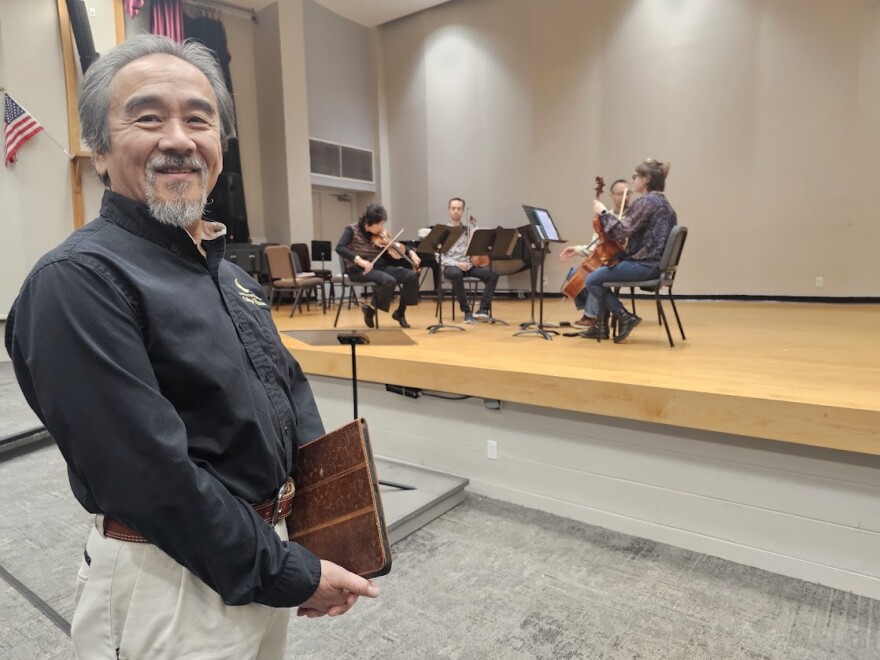Scientists at the University of Central Florida are studying saliva from dementia patients to better understand how music can benefit aging brains.
It’s no secret that music impacts people. Hearing a familiar song, especially one from your formative years, can bring back all sorts of memories.
But there’s still a lot scientists don’t know about the effects of music, especially on people with dementia. Researchers at the University of Central Florida are hoping to learn more through a new partnership between UCF’s School of Performing Arts’ Pegasus String Quartet and the College of Medicine.
On Friday, the Pegasus String Quartet will put on the second in a series of three concerts for dementia patients enrolled in a trial. The concerts are also open to the general public.
For those enrolled in the trial, UCF scientists will take samples of saliva before and after the shows to see how the music affects their brains.
“Nobody knows exactly how music affects your brain, because there's no way to look at your brain precisely (as music plays),” Dr. Kiminobu Sugaya, head of UCF’s neuroscience department, and one of the researchers, along with Dr. Mariana Dangiolo and Dr. Amoy Fraser.

Last year, Sugaya and fellow researchers developed a test to measure biomarkers found in the cells of patients’ saliva. Specifically, the biomarkers are inside “exosomes,” which are tiny vesicles (or a fluid-filled sac) released from brain cells. Researchers will be looking at biomarkers such as dopamine and serotonin to track the brain’s response to music, and maybe even help heal it, Sugaya said.
But why study music?
The reason is because of the “Mozart Effect,” which was a study conducted in 1993. Students who listened to Mozart’s “sonatas” saw a temporary improvement in their spatial-reasoning skills.
“We don't know why Mozart had this effect, but it could be very important for helping the people who are getting dementia, like Alzheimer’s disease,” he said. “If we can improve their brain function with music, that'd be great.”
Why our tools haven’t been the best for studying music and the brain
Previously, studying music’s effect on the brain has been tricky and requires innovative thinking, said Dr. Anna Galloway, a music and occupational therapist at the University of Florida. She provides music therapy for patients in Alzheimer’s memory care units. She said trying to see the neurological effect of music with brain mapping tools, such as an MRI, offers skewed results, because they’re noisy and distracting.
“They would make it harder to understand the results of brain mapping, unless you're using just the typical population of people who can understand that they're going to be in a noisy machine, and not necessarily bring in someone with dementia to the MRI machine,” she said.
There is a way to see what neurological transmitters are firing off after listening to music, but it is invasive, Sugaya said.
“You don't want to do the spinal tap, right? That's very painful, and then it could be dangerous,” he said.

Sugaya says that’s why being able to use saliva is ideal. The team already collected samples from the quartet’s first concert in October, and they’re waiting on the results. But Sugaya believes he’ll find what he’s looking for.
Last year, Sugaya studied autistic children, who can have lower blood serotonin levels. Measuring serotonin in the brain is difficult due to the blood-brain barrier.
“By using our technology, we can measure the brain-released serotonin directly in their saliva,” he said.
He collected samples before and after the kids had lunch. The theory being that serotonin levels should rise after eating, and that’s what his test found.
The power of music
Sugaya is hoping to see not only how music affects the brain but also if certain kinds of music impact the brain differently, which is something he says researchers don’t know.
“Nobody knows. But maybe after they start listening to certain music more frequently in their daily life, that could prevent the progress of (dementia),” he said.
That’s Sugaya’s hope. His wife, Professor Ayako Yonetani, hopes to help make that happen.
Yonetani is a professor of violin at UCF and the director of the Pegasus String Quartet, which is made up of herself and three graduate students. Yonetani has been teaching music at UCF for over 30 years.
“I'm a performer, I don't really believe I have that much influence, but I think the music itself has the power,” she said. “For instance, like Bach’s music, Bach is almost like an alien. It's above our humanities. I can't believe what he has composed.”

During the first concert in October, Yonetani said that dementia patients, some with late-stage Alzheimer’s, were bobbing their heads or moving their hands to the songs.
It reminded her of a time after she had released her solo CD featuring Tchaikovsky. A friend told Yonetani that she played the CD, Tchaikovsky's “Concerto” for her grandmother, who had late-stage dementia.
“After hearing the CD, she cried, and I was like, ‘wow,’” Yonetani said. “Music certainly is a power.”
The quartet will be playing classical music, but also music that the patients will recognize from their youth, like The Beatles, Elvis, and ABBA.
However, Yonetani is hoping the experiment shows more neurological stimulus for the classical songs played, giving classical music new relevance. As an avid student and fan, she’s under no illusions about the genre’s waning popularity in the zeitgeist.
Music for the brain and for the heart
And unlike her husband, Yonetani's skeptical of the “Mozart Effect.”
“But if we have more concrete evidence about what music does, and we can actually say ‘hey, classical music is really good for you,’ then maybe we can have more people look into it,” she said. “We can’t just talk around it; classical music is dying. But if we hear good things (from the experiment), we should pay attention.”
That’s a big driver for her, that the experiment can reignite more passions for the classical genre.

For her husband, Sugaya has always been a fan of the classics. That’s actually how they met. Music is the foundation of their relationship, and they’ve even taught several classes together on music and the brain.
Their first encounter occurred 20 years ago, when Sugaya heard there was a classical music concert happening on campus. That was when he first heard Yonetani perform Bach’s Chaconne.
“I listen to so many different Chaconnes, but her Chaconne is so much different,” he said.
It impressed him so much, he had to talk to her. To this day, whenever he hears Chaconne, he’s reminded of that wonderful night
“I still believe that this Chaconne, her Chaconne, is the best in the world,” he said.
When to catch the performance
The Pegasus String Quartet performance is free for all to attend, due to funding provided by the Pabst Steinmetz Foundation, which also covered patient recruitment and research. The performance is at 2 p.m. Friday at the College of Medicine’s Lewis Auditorium.
They’re scheduled to play again at 7:30 p.m. April 8, at the Doctor Phillips Center for the Performing Arts.






